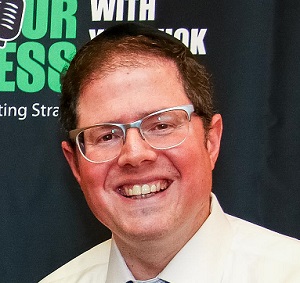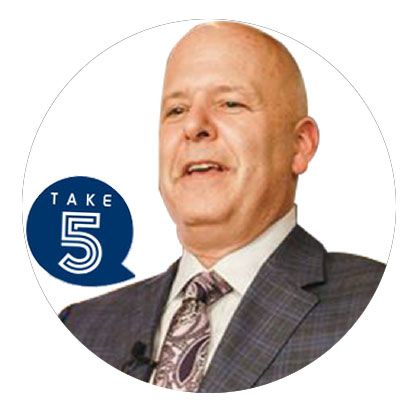Take 5: Business Tips from the Top

A
bout the Expert:
Chris O’Neill serves as CEO of Evernote — a wildly popular note-taking and organizational app. Under his leadership, Evernote has achieved incredible growth, more than doubling users in the past two years — without a sales team. Currently 220 million people around the globe use Evernote, over half of whom work in a language other than English. Prior to Evernote, O’Neill was managing director of Google Canada.
Terms to Know
Deep work: A term coined by Cal Newport, a computer scientist and author, to describe an extended period of time spent working on something that is cognitively difficult. The opposite is shallow work, such as time spent on social networking or e-mail.
1 Spend precious time and attention — in business and in life — on things you feel passionate about
O’Neill admits that his move to Evernote was, at first, “intellectual.” He saw a great product with tremendous potential to scale.
“But two and a half years in, it’s really the emotional connection I have to this brand, to our users,” Chris O’Neill explains. “I get stories almost every day of how people use Evernote.” O’Neill himself relied on Evernote for his family’s “chaotic” move from the US to Canada.
When you’re working for something you feel passionate about, it’s easier, more automatic, seamless. “There’s an emotional connection to the brand and the content that people trust that really fuels the team,” O’Neill continues. “The mission for us is, how do we help people remember things, how do we help them turn an idea into action?”
O’Neill urges people to seek that emotional connection, whether at work or in their lives in general. “I think about it the way sailors used to think about the North Star — you look up and say, ‘That’s where I’m going,’ because you are going to get buffeted by the winds of life. Resilience comes from a connection that’s bigger than yourself.”
2 Focus, focus, focus
Chris O’Neill disparages multitasking: “It’s a myth. You try to do two things at once, it halves your IQ,” he quips. To be successful in business requires maintaining a singular focus. “Do one thing and do it better than anyone else,” he suggests, rather than getting sidetracked by tangent goals or features.
This path has served Evernote well, helping the leadership team view decisions “through a very clear lens.” O’Neill also points out that using Evernote can also help other companies (or individuals) retain their focus.
Consider the day-to-day life of a typical C-suite user: constantly switching context from a board meeting to one-on-one meetings to reviewing product information. “Our minds are overloaded,” O’Neill asserts. “Anything you can do to offload the things on your mind [will help you] focus on the things at hand.”
Evernote gives you a ready home for capturing your thoughts in the moment so they don’t get lost, without disturbing the rhythm of your day. And later, you can go back and review them or follow up.
3 To really solve problems, set aside dedicated time each week for deep work
In today’s world of constant technological bombardment, deep work has become “a bit of a lost art,” laments O’Neill. That’s a shame, he says, because anything in history that was ever a breakthrough required deep work — think Benjamin Franklin, Thomas Edison, Bill Gates.
In order to engage in deep work, you need to “allow the mind to associate and connect the dots on really complicated problems. That’s hard to do when you’re interrupted a hundred times a day.”
When O’Neill first measured how much time he was spending in deep work, it came as a wake-up call. “I was embarrassed — I was spending less than 90 minutes a week.” He now carves out two hours religiously on Thursday mornings for deep work. In that time, only his wife and his assistant know how to contact him in case of emergency.
Turning off notifications on your devices is essential, O’Neill insists. “Ninety percent of them are triggering a dopamine response that is not healthy, luring you to follow up on something that can wait.” Also useful is keeping Evernote (or a regular notepad) handy to jot down thoughts and ideas as they come up, and also organize them so you can review them when you’re ready to engage in your deep work.
4 Play for the front of the jersey
A “decent hockey player” in his youth, O’Neill recalls a momentous game in which he scored several goals — but his team still ultimately lost. “I was all proud — I scored, aren’t I great? My dad pulled me aside and said, ‘What are you so happy about? Did you see the score on the board? You play for the front of the jersey, not the back.’ ”
This lesson — the team comes first — stayed with O’Neill and lives on at Evernote.
Evernote’s leadership team is made up of all-stars, explains O’Neill. They each excel in their particular fields, whether marketing or design or sales. But what makes them shine is their mindset to work together as a team.
“We have a principle called First Team… We take our functional hats off and we do things together. We make decisions for the best of the company.” Only once that’s done do they start to think about their individual functions, their pieces of the puzzle.
“Those are the characteristics of the leadership team,” stresses O’Neill.
5 Keep your beginner’s mindset
As CEO — and an ardent Evernote user — O’Neill is intimately acquainted with all the ins and outs of the app. “I give more feedback and file more bugs than anyone in the company!” he exclaims.
The drawback? Becoming too familiar.
“About every other month, I sign up for our product as if I’m brand-new. Every time I do that, I try to check my bias, and that’s a challenge.”
When you are too comfortable, when you keep doing what you’ve been doing because it’s been working — that’s when you run the risk of slowing down growth. “What got you here won’t get you to the next space,” O’Neills says.
“Part of the job of a leader is to see out around the corner and push the team out of their comfort zone,” says O’Neill. “Larry Page [of Google] had a great expression: ‘You have to be uncomfortably comfortable.’ ” Think 10×, O’Neill urges, not 10%; make something 10 times better, not just 10 percent better. Far better to set audacious goals and fall short, he declares, than set small goals that don’t really push you further. (Originally featured in Mishpacha, Issue 697)
Oops! We could not locate your form.






